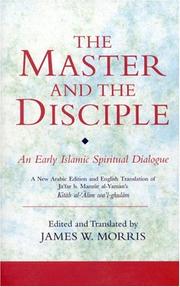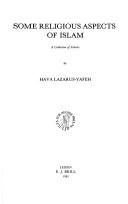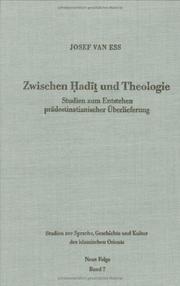| Listing 1 - 10 of 17 | << page >> |
Sort by
|

ISBN: 2900269229 9782900269220 Year: 1982 Publisher: Paris Berg international
Abstract | Keywords | Export | Availability | Bookmark
 Loading...
Loading...Choose an application
- Reference Manager
- EndNote
- RefWorks (Direct export to RefWorks)
Ismailites --- Doctrines. --- 297.1 --- -Ismaili --- Ismailians --- Assassins (Ismailites) --- Shīʻah --- Islam:--religieuze vraagstukken : indelen zoals 291.1/.8 --- Doctrines --- -Islam:--religieuze vraagstukken : indelen zoals 291.1/.8 --- 297.1 Islam:--religieuze vraagstukken : indelen zoals 291.1/.8 --- Ismailites - Doctrines.
Book
ISBN: 8422007150 9788422007159 Year: 1975 Volume: 374 Publisher: Madrid Biblioteca de autores cristianos
Abstract | Keywords | Export | Availability | Bookmark
 Loading...
Loading...Choose an application
- Reference Manager
- EndNote
- RefWorks (Direct export to RefWorks)
Islam --- 297.1 --- Islam:--religieuze vraagstukken : indelen zoals 291.1/.8 --- 297.1 Islam:--religieuze vraagstukken : indelen zoals 291.1/.8 --- Mohammedanism --- Muhammadanism --- Muslimism --- Mussulmanism --- Religions --- Muslims

ISBN: 0415045193 0415045185 0415045282 9780415045193 Year: 1993 Publisher: London Routledge
Abstract | Keywords | Export | Availability | Bookmark
 Loading...
Loading...Choose an application
- Reference Manager
- EndNote
- RefWorks (Direct export to RefWorks)
297.1 --- 297.1 Islam:--religieuze vraagstukken : indelen zoals 291.1/.8 --- Islam:--religieuze vraagstukken : indelen zoals 291.1/.8 --- Islam. --- Islam --- Muslims --- Musulmans
Book
ISBN: 0878722122 Year: 1980 Publisher: Belmont, Calif.
Abstract | Keywords | Export | Availability | Bookmark
 Loading...
Loading...Choose an application
- Reference Manager
- EndNote
- RefWorks (Direct export to RefWorks)
Islam --- 297.1 --- Mohammedanism --- Muhammadanism --- Muslimism --- Mussulmanism --- Religions --- Muslims --- 297.1 Islam:--religieuze vraagstukken : indelen zoals 291.1/.8 --- Islam:--religieuze vraagstukken : indelen zoals 291.1/.8

ISBN: 9781860647819 1860647812 9780755602629 0755602625 9780857714657 9780755616350 Year: 2020 Volume: 3 Publisher: London I.B. Tauris
Abstract | Keywords | Export | Availability | Bookmark
 Loading...
Loading...Choose an application
- Reference Manager
- EndNote
- RefWorks (Direct export to RefWorks)
Shiites --- Conversion --- Islam --- Jafar ibn Mansur al-Yaman --- Ismailites --- Doctrines --- 892.7 --- 297.1 --- 297.1 Islam:--religieuze vraagstukken : indelen zoals 291.1/.8 --- Islam:--religieuze vraagstukken : indelen zoals 291.1/.8 --- 892.7 Arabische literatuur --- Arabische literatuur --- Conversion - Islam
Book
ISBN: 0521253829 0521085160 0511752156 9780521253826 9780511752155 9780521085168 Year: 1983 Publisher: Cambridge Cambridge University Press
Abstract | Keywords | Export | Availability | Bookmark
 Loading...
Loading...Choose an application
- Reference Manager
- EndNote
- RefWorks (Direct export to RefWorks)
In Muslim Tradition G. H. A. Juynboll undertakes a broad-ranging review of the closely linked questions of date, authorship and origin of hadiths, i.e. the traditions of the prophet. Hadiths, which record the sayings and deeds of the prophet Muhammad, are central to Islamic teaching and beliefs and command a respect in the Islamic world second only to the Qur'an. The question of when, how and where particular hadiths came into existence is basic to the understanding of the formative period of Islam. This statement of a sceptical position, which can be visualized as located between, on the one hand, the orthodox Muslim view and, on the other, that of Western scholars, uses all the rich material available and explores the possibilities it opens up. The book faces major issues and reaches conclusions which may provide a basis for future debate in which, it is hoped, both Muslim and Western scholars will participate.
297.1 --- Hadith --- -Tradition (Islam) --- Islamic law --- Islamic literature --- Sunna --- 297.1 Islam:--religieuze vraagstukken : indelen zoals 291.1/.8 --- Islam:--religieuze vraagstukken : indelen zoals 291.1/.8 --- History --- Arts and Humanities --- Hadith - History --- History.
Book
ISBN: 9780199796663 9780199796731 9780199314003 9786613655455 Year: 2012 Publisher: Oxford Oxford University Press
Abstract | Keywords | Export | Availability | Bookmark
 Loading...
Loading...Choose an application
- Reference Manager
- EndNote
- RefWorks (Direct export to RefWorks)
Can non-Muslims be saved? And can those who are damned to Hell ever be redeemed? In Islam and the Fate of Others, Mohammad Hassan Khalil examines the writings of influential medieval and modern Muslim scholars on the controversial and consequential question of non-Muslim salvation. This is an illuminating study of four of the most prominent figures in the history of Islam: Ghazali, Ibn'Arabi, Ibn Taymiyya, and Rashid Rida. Khalil demonstrates that though these paradigmatic figures tended to affirm the superiority of the Islamic message, they also envisioned a God of mercy and justice and a Paradise populated by Muslims and non-Muslims. Islam and the Fate of Others reveals that these theologians'interpretations of the Qur'an and hadith corpus-from optimistic depictions of Judgment Day to notions of a temporal Hell and salvation for all-challenge widespread assumptions about Islamic scripture and thought. Along the way, Khalil examines the writings of many other important writers, such as Ibn Qayyim al-Jawziyya, Mulla Sadra, Shah Wali Allah of Delhi, Muhammad Ali of Lahore, James Robson, Sayyid Qutb, Yusuf al-Qaradawi, Farid Esack, Reza Shah-Kazemi, T. J. Winter, and Muhammad Legenhausen. Islam and the Fate of Others is both timely and overdue.
Islam --- Salvation --- Doctrines --- History. --- Islam. --- 297.1 --- Salvation (Islam) --- Mohammedanism --- Muhammadanism --- Muslimism --- Mussulmanism --- Religions --- Muslims --- 297.1 Islam:--religieuze vraagstukken : indelen zoals 291.1/.8 --- Islam:--religieuze vraagstukken : indelen zoals 291.1/.8 --- Doctrines&delete& --- History
Multi
ISSN: 12641987 ISBN: 2130471951 9782130471950 Year: 1995 Volume: *4 Publisher: Paris : PUF - Presses Universitaires de France,
Abstract | Keywords | Export | Availability | Bookmark
 Loading...
Loading...Choose an application
- Reference Manager
- EndNote
- RefWorks (Direct export to RefWorks)
Ethique islamique --- Islamic ethics --- Islamitische ethiek --- Morale islamique --- Morale musulmane --- Values --- Valeurs --- Religious aspects --- Islam --- Aspect religieux --- Islamic Ethics. --- 297.1 --- 297.15 --- Muslim ethics --- Religious ethics --- Islam:--religieuze vraagstukken : indelen zoals 291.1/.8 --- Islam: ethiek; religieuze wetten --- Islamic ethics. --- 297.15 Islam: ethiek; religieuze wetten --- 297.1 Islam:--religieuze vraagstukken : indelen zoals 291.1/.8 --- Valeurs (Philosophie) --- Islamic Ethics

ISSN: 01698834 ISBN: 9004063293 900437860X 0585375313 9780585375311 9789004378605 9789004063297 Year: 1981 Volume: 42 Publisher: Leiden Brill
Abstract | Keywords | Export | Availability | Bookmark
 Loading...
Loading...Choose an application
- Reference Manager
- EndNote
- RefWorks (Direct export to RefWorks)
297.1 --- 297.1 Islam:--religieuze vraagstukken : indelen zoals 291.1/.8 --- Islam:--religieuze vraagstukken : indelen zoals 291.1/.8 --- Islam --- Mohammedanism --- Muhammadanism --- Muslimism --- Mussulmanism --- Religions --- Muslims --- Islam. --- Religions. --- Muslims. --- Mohammedans --- Moors (People) --- Moslems --- Muhammadans --- Musalmans --- Mussalmans --- Mussulmans --- Mussulmen --- Religious adherents --- Comparative religion --- Denominations, Religious --- Religion, Comparative --- Religions, Comparative --- Religious denominations --- World religions --- Civilization --- Gods --- Religion

ISBN: 3110042908 9783110042900 Year: 1975 Volume: 7 Publisher: Berlin de Gruyter
Abstract | Keywords | Export | Availability | Bookmark
 Loading...
Loading...Choose an application
- Reference Manager
- EndNote
- RefWorks (Direct export to RefWorks)
Hadith --- Predestination (Islam) --- 297.1 --- Free will and determinism --- Islam --- Tradition (Islam) --- Islamic law --- Islamic literature --- Sunna --- Islam:--religieuze vraagstukken : indelen zoals 291.1/.8 --- Religious aspects --- Doctrines --- Hadith. --- 297.1 Islam:--religieuze vraagstukken : indelen zoals 291.1/.8 --- Predestination (Islam).
| Listing 1 - 10 of 17 | << page >> |
Sort by
|

 Search
Search Feedback
Feedback About UniCat
About UniCat  Help
Help News
News